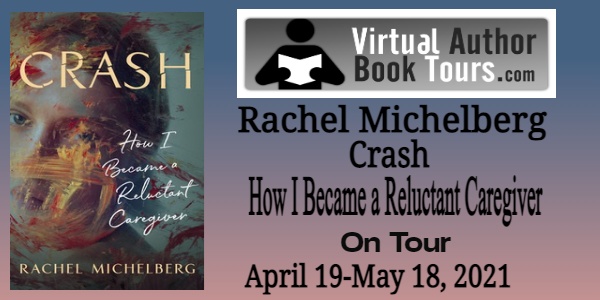
05 May 2021
Crash: How I Became A Reluctant Caregiver by Rachel Michelberg Book Tour and Giveaway!

04 May 2021
Rabbit in the Moon By Heather Diamond Tour and Interview!
Rabbit in the Moon
By Heather Diamond
Genre: Memoir
Brief description:
Blame it on Hawaii’s rainbows, sparkling beaches, fruity cocktails, and sensuous breezes. For Heather Diamond, there for a summer course on China, a sea change began when romance bloomed with Fred, an ethnomusicologist from Hong Kong.
Returning to her teaching job in Texas, Heather wonders if the whirlwind affair was a moment of madness. She is, after all, forty-five years old, married, a mother and grandmother.
Rabbit in the Moon follows Heather and Fred’s relationship as well as Heather’s challenges with multiple mid-life reinventions. When Fred goes on sabbatical, Heather finds herself on the Hong Kong island of Cheung Chau with his large, boisterous family. For an independent, reserved American, adjusting to his extended family isn’t easy.
Life on Cheung Chau is overwhelming but also wondrous. Heather chronicles family celebrations, ancestor rituals, and a rich cycle of festivals like the Hungry Ghosts Festival, Chinese New Year, and the Bun Festival. Her descriptions of daily life and traditions are exquisite, seamlessly combining the insights of an ethnographer with the fascination of a curious newcomer who gradually transitions to part of the family.
Moving between Hawaii, Hong Kong, and the continental US, Rabbit in the Moon is an honest, finely crafted meditation on intercultural marriage, the importance of family, and finding the courage to follow your dreams.
Heather Diamond is an American writer in Hong Kong. She has a Ph.D. in American Studies from the University of Hawaii and has worked as a bookseller, university lecturer, and museum curator. She is the author of American Aloha: Cultural Tourism and the Negotiation of Tradition. Her essays have appeared in Memoir Magazine, Sky Island Journal, (Her)oics: Women’s Lived Experiences of the Pandemic, Rappahannock Review, Waterwheel Review, Hong Kong Review, and New South Journal.
Links:
Website landing page: https://heatherdiamondwiter.com/rabbit-in-the-moon/
Goodreads: https://www.goodreads.com/book/show/57164283-rabbit-in-the-moon
Facebook: https://www.facebook.com/HeatherDiamondWriter
Twitter: http://twitter.com/heatheradiamond
Indiebound: https://www.indiebound.org/book/9781788692342
Brief Excerpt from book:
Our gourmet eating tour includes visiting a series of tourist centers devoted to Chinese specialty foods. Our stops include a pork floss factory, a tea farm, and an eel farm where I refuse to get out of the bus. I’ll eat eels cooked and on rice, but I have no desire to discover how they’re raised, skinned, and smoked. In the bus, Amah passes around a package of sweet, dried, and shredded pork she bought to share along with all the snacks she purchased as gifts for friends. Americans give chocolates; Chinese give pork floss. I have to admit that it’s good. I gave up eating vegetarian somewhere between the last trip and this one, partly because of my desire to be a good traveler who can fit easily into a new culture and partly because I tired of being told that there was only a little pork or chicken in Chinese dishes “for flavor.” On the last trip, my special vegetarian soup was garnished with a chicken foot, which Fred quickly snatched from my bowl. Being too much trouble is an issue I’m working on.
Because there are so many of us, meals require two large round tables. I have always had a weak stomach when it comes to cleanliness in restaurants. My father liked to tease me about going to his favorite hamburger joint, Mel’s Diner, where I once found a crispy fly in my French fries. This trip poses challenges that go beyond my issues with Chinese table etiquette.
In a Teochew restaurant in Shantou, we’re squeezed into a tiny upstairs room that holds only four tables. We’re seated on stools like the ones at Number 10, and I’m sitting near the wall when I spot a good-sized cockroach lazily ascending. Not wanting to make a scene, I nudge Fred and tip my head toward the roach. Fred calls the waitress and points. She pulls the wet towel out of her apron pocket, smacks it against the wall and the roach, and tucks the rag back into her apron. She then calmly goes back to taking orders from the next table. I tamp down my gag reflex just in time to see a winking chicken head arriving on the next platter.
I have never seen a naked, boiled chicken head, and I do not understand how anyone could think it attractive as a culinary garnish. Yet there it sits, propped up in the middle of its own chopped, steamed, and sauced flesh, one eye closed and its comb flopping left. Fred turns to me with an exaggerated wink, his fingers crooked over his head like the chicken’s comb. Stifling a giggle, I nearly choke on my tea. Mimi sees him and says she heard that if you go out with your boss and the chicken head points to you, you’ll know you’re about to be fired. This strikes me as hilarious, and as Fred plops steamed chicken into my rice bowl, I’m shaking with the effort to contain my laughter.
Back in our hotel room, I put a shower cap on my head and prance around singing a made-up chicken head song in my beginner Mandarin to the tune of “Fish Heads,” by Dr. Demento: “Ji tou, Ji tou, heng pang ji tou.” We roll on the bed, whooping and wiping our eyes. Humor, it occurs to me, might be my secret weapon for surviving Lau family travel. I already adore this man for making me laugh, for the way he laughs with his entire body — shoulders shaking, head thrown back, snorting and gasping for air. For his playfulness, his silliness, his willingness to be the epicenter of a joke by laughing at his own mistakes and foibles. The first man in my life who makes me laugh out loud and thinks my jokes are as good as his own. Serious people like me are pressure cookers with stuck safety valves. Left to ourselves, we can ferment or implode. Levity lifts the lid, lets out the steam, and connects us to the world.
Interview with author!
1. What do you find most challenging about the writing process, and how do you deal with it?
In my writing, I struggle with being both a perfectionist and impatient. On the front end of the writing process, that means I’ve had to learn to not expect my writing to be pretty when I start. Instead, I have to let my ideas be their messy selves for however long it takes to shape them into something coherent. When I start a project, I make a lot of lists, and sometimes I write in disconnected fragments. With shorter essays, I often use a collage-like process until I find a structure that fits. With a book-length project, I create scaffolds. They help with mapping, but are more organic and flexible than outlines. I’m working on a second memoir right now that is still in the early stages, and although I am using a scaffold to set the parameters, I am also waiting for the writing itself to tell me what shape the book will finally take.
On the the revising end of my writing process, I’ve learned to temper my impatience and not assume I know when a piece of writing is ready to go out. All of my published writing has benefited from honest critique partners and hair-splitting editors. I was fortunate to have two wonderful editors at Camphor Press who are expats in Taiwan and Chinese speakers. They asked me hard questions and caught minor details I had missed. Writing is often solitary, but I now I know that creating a book requires a team!
2. When and where do you do your writing?
. I’m a binge-writer rather than a disciplined, daily writer. When I am rolling with an idea, I can write for hours. When an idea is percolating, I’m scrubbing grout with a toothbrush instead of writing. As for where I write, I wish I could say I retreat to a cabin in the woods or a lovely sound-proofed study with a view of a garden, but mostly I’ve been writing wherever I can. A year ago, I was writing on a card table in my mother’s messy guestroom full of stuffed animals. Parts of my memoir were written in the corner of a loft bedroom in a Hawaii condo inundated with construction noise. Some chapters were written in a Honolulu coffee shop. Most of the revision was done in a study (finally, a room of my own!) in our Hong Kong flat where construction noise often includes concrete drills directly overhead and the upstairs neighbor playing piano. Now that I think of it, I wrote my dissertation in a shared study in Hawaii with kids playing outside and someone practicing piano across the way. Noise blocking headphones are way up there on my list of sanity-saving modern inventions, and I’m most focused when there is a cat snoozing on my desk.
3. What have you learned about promoting your books?
Book promotion might be the ultimate irony for an introverted memoirist. I spent four years writing and revising a book about being an shy introvert plunged into an extroverted culture and noisy Cantonese family. When I was living that, books were my escape, but to promote my book I have had to get out of that comfort zone and make some noise myself. That doesn’t come naturally, but through my connections on social media and elsewhere, I’ve discovered that this part of the process is a lot like teaching, which I did for many years. The only reason I could get up in front of a class full of college students was because the books and ideas I was teaching were bigger than me. I was just a conduit, the messenger. The same goes for promoting my writing. I wrote Rabbit in the Moon because I wanted to pass on what I had learned about Chinese culture, about families, and about reinvention and acceptance of others and myself.
One of the most heart-warming rewards an author can receive is hearing that something one wrote resonates or opened a door for a reader. So far, I’ve heard from advance readers in cross-cultural marriages, expats remembering their acculturation process, women who’ve upended their lives midstream, and Chinese Americans who’ve lost touch with traditions. That kind of connection reminds me that writing has a life of its own once we launch it into the world and makes the efforts to get my book out there worthwhile.
4. What are you most proud of as a writer?
I’m a late bloomer, and I’m most proud of myself for finally giving myself permission to write and for persisting once I started. I wrote poetry in my teens and studied art in my twenties, but I abandoned both to trying to survive as a single parent. I had a bookstore in my thirties, taught college composition and literature for decades, and became a museum curator on the cusp of sixty. In each of those jobs, I spent my creativity in the service of others. It wasn’t until I was sixty-five that I took an online writing class and realized that I had things I wanted to say and that creative non-fiction writing was something I could master if I was willing to be a beginner. Coming to writing so late has also lent it an air of urgency. I quit everything else to do this, so I can’t give up even though I considered quitting a few times along the way. Another factor is that I have no idea how long I have to write the books and essays I want, so I can't let life disruptions stop me.
5. If you could have dinner with any writer, living or dead, who would it be and what would you talk about?
I’d love to have a long dinner with Pearl Buck, but we’d need more than an evening to cover all the topics I’d want to hear about. She was a remarkable woman who was ahead of her time in many ways. She was a child of progressive American missionaries who raised her in pre-re revolutionary China. She learned to speak, read, and write Chinese and became bicultural in ways many people in the missionary community did not. She witnessed the Boxer Rebellion, survived the Nanking Incident, and was denounced by Maoists as a cultural imperialist for championing the cause of peasants in Anhui Province. She became an advocate for adoption of mixed race children and against racism. She was a feminist and a human rights champion who was brave enough to speak out against western cultural imperialism in China.
Once I stopped asking what it was like to be in China back then, I’d want to know what it was like to always be going against the grain of your own country’s arrogance and ignorance? I’d want to hear what she thought would solve the impasses in American race relations today, especially the current wave of anti-Asian racism. What would help Americans better understand Asia and Asians? I’d be curious about her views on how Chinese society has evolved since Mao. And how on earth did she balance writing with motherhood and all the turmoil in her life? How might her life have been different if she had been raised in the West? We might never get to dessert.
Out Front the Following Sea: A Novel of King William’s War in 17th-Century New England by Leah Angstman Book Tour and Giveaway! @hfvbt @leahangstman @RegalHouse1 #FollowingSea #LeahAngstmann #CoverReveal #HFVBTBlogTours

Out Front the Following Sea: A Novel of King William’s War in 17th-Century New England
by Leah Angstman
Publication Date: January 11, 2022
Regal House Publishing
Hardcover, Paperback, eBook, Audiobook; 334 pages
Genre: Historical / Literary / Epic
**Shortlisted for the Chaucer Book Award**
OUT FRONT THE FOLLOWING SEA is a historical epic of one woman’s survival in a time when the wilderness is still wild, heresy is publicly punishable, and being independent is worse than scorned—it is a death sentence.At the onset of King William’s War between French and English settlers in 1689 New England, Ruth Miner is accused of witchcraft for the murder of her parents and must flee the brutality of her town. She stows away on the ship of the only other person who knows her innocence: an audacious sailor—Owen—bound to her by years of attraction, friendship, and shared secrets. But when Owen’s French ancestry finds him at odds with a violent English commander, the turmoil becomes life-or-death for the sailor, the headstrong Ruth, and the cast of Quakers, Pequot Indians, soldiers, highwaymen, and townsfolk dragged into the fray. Now Ruth must choose between sending Owen to the gallows or keeping her own neck from the noose.
Steeped in historical events and culminating in a little-known war on pre-American soil, OUT FRONT THE FOLLOWING SEA is a story of early feminism, misogyny, arbitrary rulings, persecution, and the treatment of outcasts, with parallels still mirrored and echoed in today’s society. The debut novel will appeal to readers of Paulette Jiles, Alexander Chee, Hilary Mantel, James Clavell, Bernard Cornwell, TaraShea Nesbit, Geraldine Brooks, Stephanie Dray, Patrick O’Brian, and E. L. Doctorow.
Available for Pre-Order
Regal House Print | Amazon Kindle
Praise
“With OUT FRONT THE FOLLOWING SEA, Leah Angstman reveals herself as a brave new voice in historical fiction. With staggering authenticity, Angstman gives us a story of America before it was America—an era rife with witch hunts and colonial intrigue and New World battles all but forgotten in our history books and popular culture. This is historical fiction that speaks to the present, recalling the bold spirits and cultural upheavals of a nation yet to be born.” —Taylor Brown, author of PRIDE OF EDEN, GODS OF HOWL MOUNTAIN, and THE RIVER OF KINGS“Steeped in lush prose, authentic period detail, and edge-of-your-seat action, OUT FRONT THE FOLLOWING SEA is a rollicking good read. Leah Angstman keeps the story moving at a breathtaking pace, and she knows more 17th-century seafaring language and items of everyday use than you can shake a stick at. The result is a compelling work of romance, adventure, and historical illumination that pulls the reader straight in.” —Rilla Askew, author of FIRE IN BEULAH, THE MERCY SEAT, and KIND OF KIN
“Lapidary in its research and lively in its voice, OUT FRONT THE FOLLOWING SEA by Leah Angstman is a rollicking story, racing along with wind in its sails. Though her tale unfolds hundreds of years in America’s past, Ruth Miner is the kind of high-spirited heroine whose high adventures haul you in and hold you fast.” —Kathleen Rooney, author of LILLIAN BOXFISH TAKES A WALK and CHER AMI AND MAJOR WHITTLESEY
“Leah Angstman has written the historical novel that I didn’t know I needed to read. OUT FRONT THE FOLLOWING SEA is set in an oft-forgotten time in the brutal wilds of pre-America that is so vividly and authentically drawn, with characters that are so alive and relevant, and a narrative so masterfully paced and plotted, that Angstman has performed the miracle of layering the tumultuous past over our troubled present to gift us a sparkling new reality.” —Kevin Catalano, author of WHERE THE SUN SHINES OUT and DELETED SCENES AND OTHER STORIES
“OUT FRONT THE FOLLOWING SEA is a fascinating book, the kind of historical novel that evokes its time and place so vividly that the effect is just shy of hallucinogenic. I enjoyed it immensely.” —Scott Phillips, author of THE ICE HARVEST, THE WALKAWAY, COTTONWOOD, and HOP ALLEY
“OUT FRONT THE FOLLOWING SEA is a meticulously researched novel that mixes history, love story, and suspense. Watching Angstman’s willful protagonist, Ruth Miner, openly challenge the brutal world of 17th-century New England, with its limiting ideas about gender, race, and science, was a delight.” —Aline Ohanesian, author of ORHAN’S INHERITANCE
“Leah Angstman is a gifted storyteller with a poet’s sense of both beauty and darkness, and her stunning historical novel, OUT FRONT THE FOLLOWING SEA, establishes her as one of the most exciting young novelists in the country. Angstman plunges the reader into a brilliantly realized historical milieu peopled by characters real enough to touch. And in Ruth Miner, we are introduced to one of the most compelling protagonists in contemporary literature, a penetratingly intelligent, headstrong woman who is trying to survive on her wits alone in a Colonial America that you won’t find in the history books. A compulsive, vivid read that will change the way you look at the origins of our country, Leah Angstman’s OUT FRONT THE FOLLOWING SEA announces the arrival of a preternatural talent.” —Ashley Shelby, author of MURI and SOUTH POLE STATION
“Rich, lyrical, and atmospheric, with a poet’s hand and a historian’s attention to detail. In OUT FRONT THE FOLLOWING SEA, Leah Angstman creates an immersive world for readers to get lost in and a fascinating story to propel them through it. A thoroughly engaging and compelling tale.” —Steph Post, author of HOLDING SMOKE, MIRACULUM, and WALK IN THE FIRE
“It’s a rare story that makes you thankful for having read and experienced it. It’s rarer still for a story to evoke so wholly, so powerfully, another place and time as to make you thankful for the gifts that exist around you, which you take for granted. OUT FRONT THE FOLLOWING SEA is a book rich with misery, yet its characters are indefatigable; they yearn, despite their troubles, for victories personal and societal. Leah Angstman’s eye is keen, and her ability to transport you into America’s beginnings is powerful. With the raw ingredients of history, she creates a story both dashing and pensive, robust yet believable. From an unforgiving time, Angstman draws out a tale of all things inhuman, but one that reminds us of that which is best in all of us.”
—Eric Shonkwiler, author of ABOVE ALL MEN and 8TH STREET POWER AND LIGHT
About the Author

Website | Facebook | Twitter | Instagram | Goodreads | Medium | Ello | Mailing List
Cover Reveal Hosts
A Darn Good Read
Books, Cooks, Looks
Bookworlder
CelticLady's Reviews
Chicks, Rogues and Scandals
Coffee and Ink
Donna's Book Blog
Jessica Belmont
Little But Fierce Book Diary
Novels Alive
Passages to the Past
Pursuing Stacie
Reading is My Remedy
The Caffeinated Bibliophile
The Enchanted Shelf
Two Bookish Babes
ARC Giveaway!
Isabelle and Alexander By Rebecca Anderson Book Tour!
Isabelle and Alexander
By Rebecca Anderson
Publication Date 5/4/21
Paperback
ISBN: 9781629728476
Retail Price:$15.99
Page Count:368
Proper Romance Victorian
Cover Art: Mark Owen/Arc Angel
Art Direction: Richard Erickson
Design: Heather G.Ward
Synopsis:
Manchester, 1850
Isabelle Rackham knows she will not marry for love. Though arranged marriages have fallen out of fashion, hers has been settled for some time. Alexander Osgood is handsome, well-known, and wealthy, but he is distant and aloof, spending much of his time at his textile mill.
Moreover, Northern England is nothing like Isabelle's home in the Lake Country, and her marriage is far from the fairy tale she expected. Conversations with Alexander are awkward, when they happen at all, and Isabelle struggles with loneliness.
Sensing his wife's unhappiness, Alexander brings Isabelle to his country estate. During their time together, the couple begins to build a friendship, opening up to each other about the details of their lives. But when a tragic accident leaves Alexander unable to walk, their fledgling relationship is tested.
Isabelle is determined to see to her husband's recovery, and in caring for him, she discovers within herself an untapped well of strength and courage. In learning to rely on each other, the couple has an opportunity to forge a love connection that they both have longed for but never dreamed could be.
www.shadowmountain.com
About the Author:
By night, Rebecca Anderson writes historical romances. By day, she
sets aside her pseudonym and resumes her life as Becca Wilhite:
teacher, happy wife, and a mom to four above-average kids. She loves
hiking, Broadway shows, food, books, and movies.
You can find her online at beccawilhite.com
For author interview requests, please contact Callie Hansen at
chansen@shadowmountain.com
Advanced Praise:
“Anderson’s first foray into historical romance is an atypical, yet satisfying story set in Victorian Manchester’s upper middle class. Hand this to readers looking for a book that navigates the peaks and valleys of two strangers attempting to make a life together despite the hardships life throws at them.” -Library Journal
“Isabelle transitions from an unaware, leisure-class woman to a more enlightened spouse and supporter of the working class. Intimacy and romance develop between Isabelle and Alexander because of simple gestures, like a long look or a thoughtful gift, and their conversations. Their slow, stately courting is reader appropriate for any age or audience. Manchester also gets its due as a place of grit and incredible production. Descriptions of bustling mills reveal their impact on the couple’s family and its fortunes. Isabelle and Alexander is an intimate and touching romance novel that focuses on women’s lives in the business class of industrial England.”
-Foreword Reviews
“Isabelle must use her quiet spunk, busy mind, and compassionate spirit to woo her husband in a wholly new way. Anderson's debut is a lovely northern England Victorian romance about confronting the seemingly impossible and the power of empathy. Anderson also addresses the time period’s treatment of physical and intellectual disabilities. Most of all, she beautifully depicts love in its many forms beyond romance, such as compassion, patience, and vulnerability; and her characters illustrate the ways that these expressions of love carry us through even the darkest hours. Isabelle’s loving and persevering fervor and devotion will resonate with any caregiver’s heart.”
-Booklist
Purchase Links:
www.shadowmountain.com







